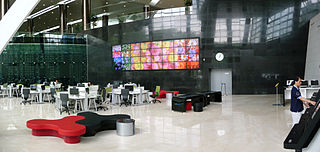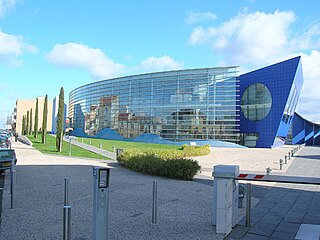 W
WBookless libraries are public, academic and school libraries that do not have any printed books. Instead they offer all-digital collections of literary works, reading material and scientific and academic research material. A bookless library typically uses the space that would have once been used for books to offer public computers, e-readers and other technology used to consume and produce digital media. Over the last decade, driven by changes in scholarly communication, several major research libraries have successfully become bookless.
 W
WA cabinet de lecture was an establishment where members of the public in the 18th and 19th centuries could, in exchange for a small fee, read public papers, as well as old and new literary works. Individuals were able to hire books by the hour, making cabinet de lectures "precursors of modern libraries and an important and reliable market for books"
 W
WA chained library is a library where the books are attached to their bookcase by a chain, which is sufficiently long enough to allow the books to be taken from their shelves and read, but not removed from the library itself. This would prevent theft of the library's materials. However, it also led to crowding and awkwardness when readers had to stand side by side, each holding a book or clumping so they could share one. The practice was usual for reference libraries from the Middle Ages to around the 18th century. However, since the chaining process was also expensive, it was not used on all books. Only the more valuable books in a collection were chained. This included reference books and large books.
 W
WA circulating library was first and foremost a business venture. The intention was to profit from lending books to the public for a fee.
 W
WLearning Resource Centre (LRC) is a term which is used in the United Kingdom to describe a type of library that exists within an educational setting such as secondary schools, further education colleges and universities. LRC can also stand for Library Resource Centre and in some cases Learning Resource Centre has been shortened to Learning Centre. Learning Resource Centres are similar to a hybrid library.
 W
WA multimedia library is a public institution functioning as a library, containing not only paper and electronic books, newspapers and magazines, but also multimedia materials like videos and sound recordings.
 W
WA school library is a library within a school where students, staff, and often, parents of a public or private school have access to a variety of resources. The goal of the school library media center is to ensure that all members of the school community have equitable access "to books and reading, to information, and to information technology." A school library media center "uses all types of media... is automated, and utilizes the Internet [as well as books] for information gathering." School libraries are distinct from public libraries because they serve as "learner-oriented laboratories which support, extend, and individualize the school's curriculum... A school library serves as the center and coordinating agency for all material used in the school."
 W
WA slide library is a library that houses a collection of photographic slides, either as a part of a larger library or photo archive, or standing alone within a larger organization, such as an academic department of a college or university, a museum, or a corporation. Typically, a "slide library" contains slides depicting artwork, architecture, or cultural objects, and is typically used for the study, teaching, and documentation of art history, architectural history, and visual culture. Other academic disciplines, such as biology and other sciences, also maintain image collections akin to slide libraries. Corporations may also have image libraries to maintain and document their publications and history. Increasingly, these types of libraries are known as "Visual Resources Collections," as they may be responsible for all "visual" materials for the study of a subject and include still and moving images in a variety of physical and virtual formats. They may contain:35mm slides lantern slides mounted study photographs born digital images 35mm, 8mm film
 W
WA special library is a library that provides specialized information resources on a particular subject, serves a specialized and limited clientele, and delivers specialized services to that clientele. Special libraries include corporate libraries, government libraries, law libraries, medical libraries, museum libraries, news libraries. Special libraries also exist within academic institutions. These libraries are included as special libraries because they are often funded separately from the rest of the university and they serve a targeted group of users.